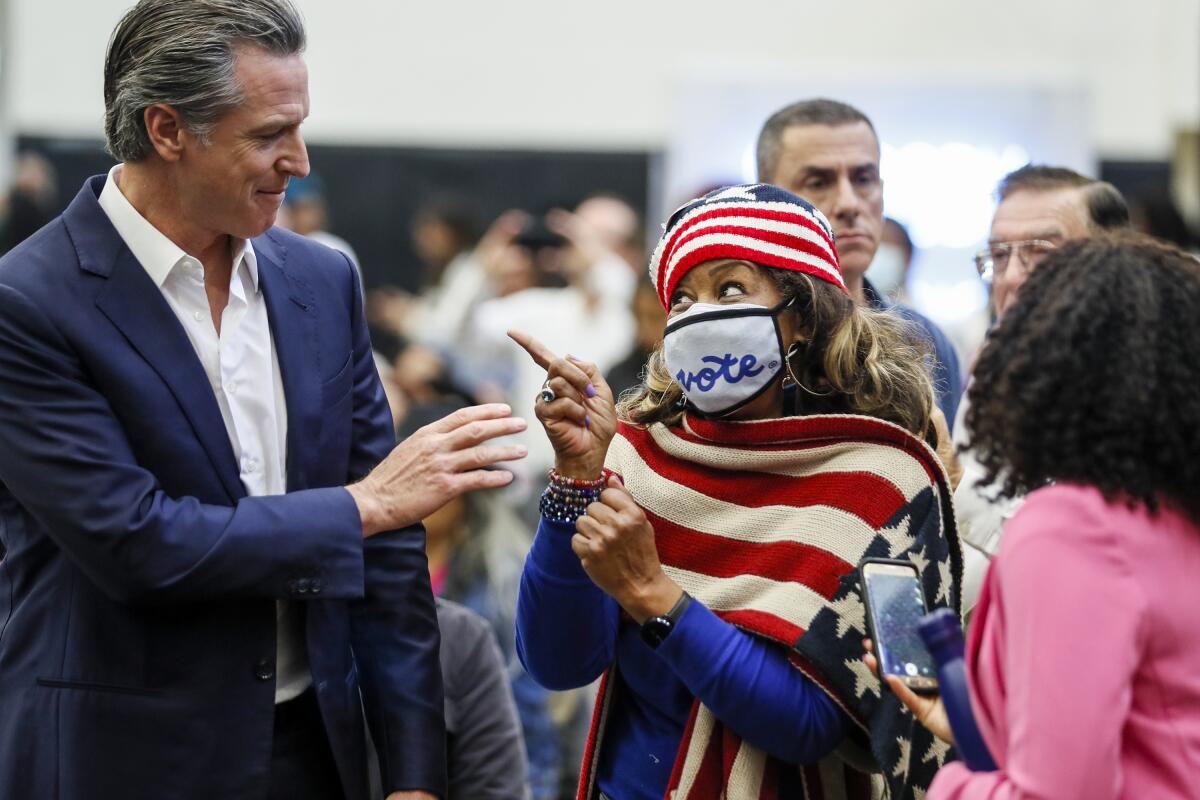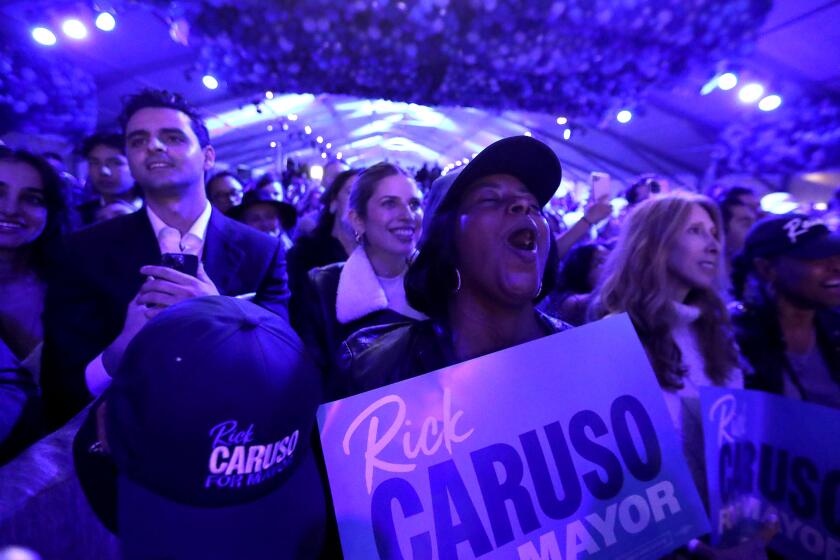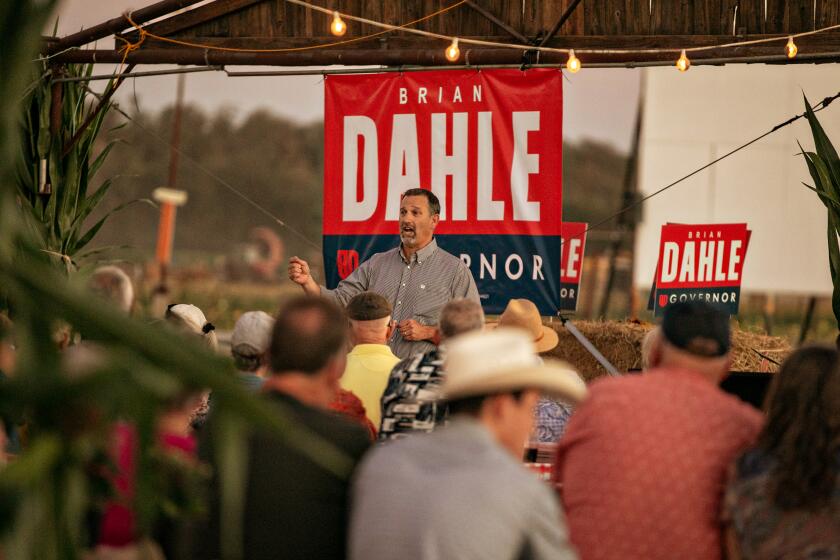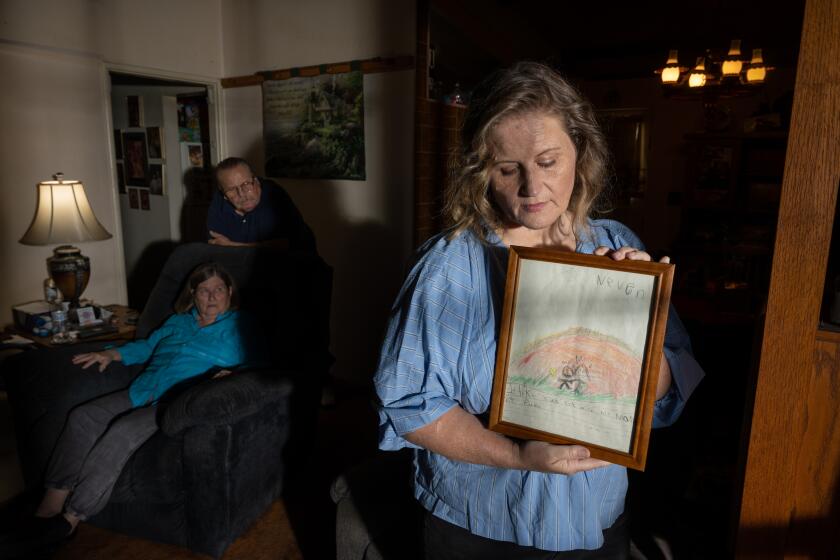California voters elect Gov. Gavin Newsom to a second term

- Share via
SACRAMENTO — California voters Tuesday handed Gavin Newsom a second term as governor, choosing the incumbent over Brian Dahle, an unfamiliar Republican state senator from Lassen County who struggled to compete with the Democratic political heavyweight.
The race was called by the Associated Press shortly after polls closed at 8 p.m., with Newsom’s early lead over Dahle predicted to grow as more results are tallied in the coming days.
The election solidifies the 55-year-old Democrat’s success at the ballot box. Newsom captured the governor’s office in 2018 with the biggest margin of victory in more than half a century and buried the GOP-led effort to recall him by the same advantage three years later.
After easily defeating Dahle, the socially progressive governor returns for another four years to lead a state on the verge of becoming the fourth-largest economy in the world while simultaneously experiencing record homelessness, a dire shortage of affordable housing, and rising crime.
As he cast his ballot in downtown Sacramento on Tuesday morning, the governor pledged to continue to focus on the problems plaguing the state. He thanked California voters hours later in an election night acceptance speech with his family at his side, saying he was humbled to be elected for another four years.
“We have governors that won their reelections tonight in other states that are banning books, that are banning speech, that are banning abortion and here we are in California moving in a completely different direction,” Newsom said. “That’s a deep point of pride and it’s with that passion that I bring to this second term a resolve to do more to advance that cause of freedom and fairness.”
Photos: Caruso and Bass battle; Luna takes early lead in sheriff’s race; City Council contests close
Businessman Rick Caruso and U.S. Rep. Karen Bass were in a tight battle in the race for mayor of Los Angeles.
Tuesday ended an unusually quiet campaign from a governor who vigorously defended himself against the recall effort last year.
President Biden, Vice President Kamala Harris and U.S. Sens. Elizabeth Warren and Bernie Sanders all stepped up in 2021 to support Newsom with appearances on the campaign trail and in advertisements, helping the governor’s political team cast his top replacement opponent, Larry Elder, as a Trump-aligned extremist.
This time around Newsom didn’t call in any big name political reinforcements and he seldom acknowledged his opponent. The governor ran only one television advertisement that called out Dahle’s opposition to abortion in May, days after a draft of the U.S. Supreme Court decision to overturn Roe vs. Wade made headlines, and participated in one debate against his opponent.
A 56-year-old seed and livestock farmer, Dahle served 16 years on his local Board of Supervisors before his election to the California Assembly in 2012 and to the state Senate in 2019.
Polls show that it would take divine intervention for gubernatorial candidate Brian Dahle to defeat Gov. Gavin Newsom in a state where Democrats outnumber Republicans 2 to 1.
Though a seasoned politician and well-liked in Sacramento by lawmakers of both parties, Dahle faced insurmountable odds.
“I am not willing to leave this broken California to my children, your children and our grandchildren,” Dahle said in Redding as he declared his intent to run in February. “I cannot stand aside and watch corrupt one-party rule continue to poison the future of our state.”
But Dahle failed to overcome the fundamental problems he started with nine months ago: An inability to raise enough money to spread that message and an “R” next to his name on the ballot in a state where registered Democrats outnumber registered Republicans by nearly 2 to 1.
Newsom brought in $24.7 million in total contributions compared to the $2.5 million Dahle raised, according to a tally as of Tuesday.
Sean Clegg, Newsom’s senior political strategist, said the leak of the Roe decision created an opportunity to focus the primary campaign on the issue of abortion and draw contrast with Dahle.
Newsom and his team changed tactics after the June 7 election and tried to generate attention on Proposition 1, a constitutional amendment to explicitly protect the right to an abortion. Newsom promoted the measure in his only in-state ad during the general election, which failed to mention his reelection bid.
Proposition 1 would amend the state Constitution to add protections for abortion rights.
“Once you’ve got a general election dance card and you don’t have a lot of swing voters in this election, then you start to look at what’s the most effective approach for my campaign to help the whole Democratic ticket in California,” Clegg said. “Prop. 1 is a turnout driver to the extent that people know it’s on the ballot.”
Led by Senate President Pro Tem Toni Atkins (D-San Diego), Democratic lawmakers voted to place the measure on the ballot this year with the hope that it would inspire voters in their party to participate in the midterm election. Voters overwhelmingly supported Proposition 1 in early returns.
As a progressive on social issues, abortion rights is among several causes Newsom attached himself to since becoming governor in a landslide victory over Republican businessman John Cox four years ago.
Newsom relied on the state’s historic tax revenues to fund an expansion of Medi-Cal to cover all immigrants in 2024, the expansion of paid family leave, two years of free community college and free preschool for 4-year-olds, among other programs to bolster the social safety net and provide more opportunity for upward mobility to those living in poverty.
But as a longtime owner of hospitality businesses, including wineries, restaurants and a San Francisco wine shop, his record wasn’t quite as far left as his liberal image.
Newsom convinced lawmakers to pass a series of tough climate policies and at the same time extend operations at Diablo Canyon, reversing an agreement that environmental groups pushed for six years ago to shut down California’s last remaining nuclear plant out of safety concerns.
Civil rights organizations opposed the governor’s plan to provide court-ordered treatment for unhoused Californians struggling with mental illness and addiction, arguing that housing and voluntary care is a more humane and effective method.
Newsom has pledged to continue to pressure local governments to build more housing and offer a more robust response to the homelessness crisis in his second term. In a bit of political opportunism one week before the election, the governor called out local governments for “settling for the status quo” on plans to reduce homelessness and urged more ambitious targets.
The CARE Court bill is on Gov. Newsom’s desk, months after he introduced it as one of his main policy priorities.
Tent encampments along sidewalks and under overpasses have fed a national image of California, which the national and state GOP seized on during the recall election and Dahle blamed Newsom for on the campaign trail. The housing crisis and rising crime seemed to be a potential vulnerability for Newsom, with opinion polls showing that voters were unsatisfied with the direction the state is heading in.
But political observers argue the outcomes of Newsom’s reelection and the recall have been foregone conclusions since July 2021, when no other well-known Democrat chose to challenge him in the recall. The presence of a high-profile Democratic replacement on the ballot could have given dissatisfied Democratic and independent voters a viable alternative to Newsom and an incentive to oust him.
Newsom and his political team fought a shadow campaign to keep all other well-known Democrats off the 2021 recall ballot and succeeded, giving the governor an easy opportunity to compare his leadership with Elder’s. Earning the support of 61.9% of voters made him an even more formidable candidate for reelection, scaring off any would-be challengers.
“I think he found his voice in the recall and hasn’t looked back,” Clegg said. “He’s found a different stride.”
Newsom describes that difference as feeling a “deeper sense of urgency” and “more forceful in my willingness to express myself and to communicate that expression.”
After publicly sparring with President Trump during his first two years in office, the governor channelled his frustrations with the GOP on Republican governors, with a particular focus on Ron DeSantis of Florida and Greg Abbott of Texas, after the recall election. The governor paid for billboards in conservative states promoting California’s abortion rights and took out advertisements in Florida criticizing the state’s GOP leaders.
His second term is expected to kick off with another fight with the oil industry next month, when, at Newsom’s urging, lawmakers begin a special session to consider a windfall tax on excessive profits. The governor has repeatedly accused the oil industry of price-gouging California consumers.
“I’m a different person and I’m just winding up,” Newsom said in an interview days before the election. “And that’s just the coming attraction. If I have the privilege of doing this job for another four years, you ain’t seen nothing yet.”
More to Read
Sign up for Essential California
The most important California stories and recommendations in your inbox every morning.
You may occasionally receive promotional content from the Los Angeles Times.















